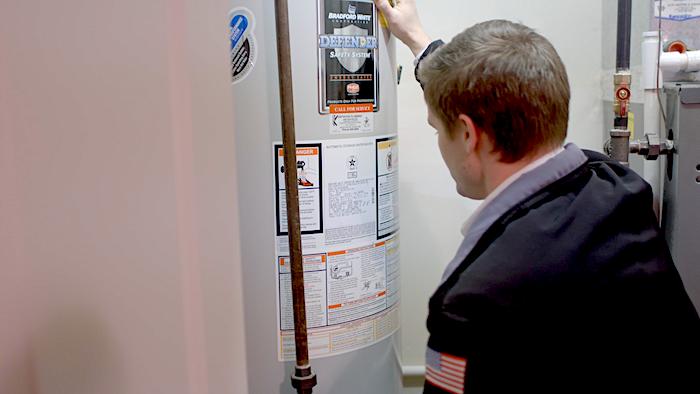Recently, Mechanical Hub spoke with Dustin Bowerman, Director – Corporate Training and Product Support, Bradford White, regarding information surrounding gas vs. electric water heaters. The following is an exclusive Q&A.
Which type of water heater is more environmentally friendly? Why?
Bowerman: Although gas heaters have an exhaust element that most will immediately say is less environmentally friendly, you have to consider the carbon footprint of how the electricity is generated, too. Unless coming from a renewable source, there is an inherent environmental effect with both of these fuel sources.
What is the difference in cost between the two types?
Bowerman: It’s mostly about supply and demand, although there is a regulatory element. As a rule, residential electric water heaters have fewer components, therefore are less costly to manufacture; however, in some locations, regulations or codes are driving towards the use of heat pump water heaters (HPWHs).

Is there a noticeable difference in return on investment for each type?
Bowerman: Both categories offer high efficiency options, as well as specialty products such as tankless or heat pump water heaters, that can reduce utility spend while delivering the same amount or more hot water than previous models. Though, these higher efficiency options typically come with higher maintenance costs.
Normally, a homeowner will request a replacement of what was already there. How difficult is it to change to a specific water heater source (gas or electric) if the home is equipped with only on type of energy source? (If home has only electric source for WH, what goes into gas conversion and vice versa)
Bowerman: Upgrading utilities can be fairly involved and will certainly require a professional’s experience. If converting from gas to electric, not only will a plumber be needed, but the job will require an electrician, to upgrade the electrical panel and run an outlet for an electric water heater. Converting from electric to gas may require adding gas piping to the home or updating the system to handle the additional demand. An all-electric home likely doesn’t have a chimney system, making gas water heater options more limited. Direct vent, power vent or power direct gas model would need to be utilized. Natural gas availability is also sometimes limited, so propane options may have to be considered if a home or business owner wants to stop using an electric product.
Overall, which is easier to install?
Bowerman: Water connections are the same on both gas and electric. Gas water heaters will have both a gas connection and an exhaust connection that must be done to complete the installation. An electric water heater has line voltage connections with, as a rule, three connections total. Both should be safely installed to comply with all local code requirements by a professional.
Does brand matter more than water heater type?
Bowerman: The type of application is always important, just like having the right tool for the job. Both types of water heaters have their strengths. Of course, brand does matter. Not every water heater is manufactured to the same level of quality nor does every company provide the same level of support and customer service.
There is a lot of talk about legionella and water-borne pathogens lately. Is there one type that is more beneficial in terms of this?
Bowerman: No. Energy source does not impact the quality of the cold-water supply being delivered to the water heater.
What is the ratio of homeowners across the country using one type over the other?
Bowerman: Generally, the entire water heater market is close to a 50/50 split on gas versus electric.
For electric, what happens during a power outage?
Bowerman: The electric water heater requires electricity to heat water. If power is lost, the tank will not reheat the stored water until the power is restored. The already heated water in the tank will remain usable until depleted or gradually cool down.
Does tankless (electric vs. gas) add another layer or dimension to this conversation? Explain.
Bowerman: Yes. Conversations about tankless water heaters are common; however, in many situations the electric options are not as often considered for whole home applications. Electrical requirements may be unrealistic for many homes while gas technologies have made great advancements making tankless gas viable, using natural gas or propane, in the right installations and climates.
Is the footprint between the two (gas vs. electric) noticeable in terms of space?
Bowerman: In terms of the actual products, like gallon capacities are commonly similar diameters, using comparable footprints. Overall, space variations will be more about the gas product’s “add-ons” (e.g. blower, draft hood) due to venting requirements.
In terms of longevity, which type is more reliable?
Bowerman: National averages for functional lifespan tend to be a couple years longer on electric water heaters.
Can you talk in terms of efficiency for both types?
Bowerman: Both energy sources offer high efficiency models. If looking at base models, electric water heaters employ immersion heating elements. As these are directly submersed into the water, most of the elements’ heat energy is being absorbed into the surrounding water. Gas water heaters employ a combustion chamber that traditionally is located below the water tank. Heat is transferred through the bottom of the tank in addition to the flue(s) that is surrounded by the stored water.
This isn’t the whole story. Annual operating cost is another measurement than can be used to compare models. While these costs are largely influenced by the local utility pricing, gas models usually show less annual operating costs. Water heaters are rated based upon how much hot water they can deliver (i.e. First Hour Rating). Depending on their First Hour Rating, models will fall into one of four draw bins. A model must only be compared to other models in the same draw bin, as this will impact the operating cost.
Could the decision gas vs. electric come down to how much water will be needed to heat? (How many people in the home and for what functions)
Bowerman: Infrastructure, what fuel source is available, and hot water demand are the largest variables in water heater selection and contractors need to understand these prior to making suggestions and doing installations.
Are electric water heaters safer?
Bowerman: Having your water heater installed and serviced by a qualified professional is the best way to make sure that your gas or electric fueled water heater is performing properly and safely.
Finally, why is the question of gas vs. electric so polarizing?
Bowerman: It’s due to a lack of understanding. For many contractors in the plumbing trade, electricity is not a part of their daily work, making it mysterious. For consumers, it’s similar. They are generally more comfortable with what they use on a daily basis and has historically worked for them.



